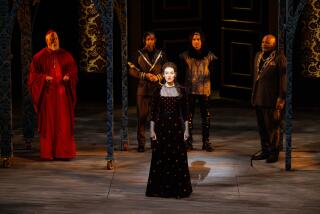Why, and how, we should read Shakespeare today
- Share via
Thursday is William Shakespeare’s 451st birthday and the 399th anniversary of his passing -- April 23 being the generally accepted date of the Bard’s birth in 1564 and his death in 1616. Thus does 2015 fall between the cracks in the Shakespearean calendar.
Still, there’s no reason not to honor Shakespeare in any year. I’m doing so in two ways. One is by reading Garry Wills’ 2014 book “Making Make-Believe Real,” his fascinating study of “Politics as Theater in Shakespeare’s Time.”
Wills’ goal is to take down by a notch some recently popular Shakespeare scholars, like Stephen Greenblatt, the bestselling founder of the New Historicist critical school, by challenging their interpretations of the plays. Wills’ deconstructions of “The Taming of the Shrew” and “Henry V” in the context of the fashions of courtly love and the religious politics of their times are worth the price of his book. And I second his recommendation of the BBC’s 1980 production, directed by Jonathan Miller and available for streaming via Amazon: John Cleese’s performance is hilarious -- Petruchio via Basil Fawlty.
My second act of homage is the acquisition, finally, of a volume of collected works to replace my tattered Harcourt Brace edition, a relic of undergrad years still bulging with my professor’s handouts and marked up with my marginal annotations.
I chose the Modern Library’s edition based on the First Folio, chiefly for its perceptive essays by Oxford scholar Jonathan Bate and copious notes. (The Oxford University Press edition of the complete works dispenses with notes, displaying the supercilious assumption that any Shakespeare reader who needs help with his vocabulary must be a worthless dunce.)
The enduring marvel of Shakespeare is the suppleness of his appeal. It’s the key to his universality too. For some people the great pleasure is reading the plays on the page, some treasure a finely wrought stage production. Those who know Shakespeare only through the Big Majors of “HamletOthelloLearMacbeth” and those high school staples “Julius Caesar” and “Romeo and Juliet” don’t know what they’re missing. Every so often I like to dip into one of the 37 plays I’ve never read; this year it’s the underappreciated comedy “Love’s Labour’s Lost,” neglected despite -- or maybe because of -- its glistening topical wordplay.
My favorite play to read in college was “Antony and Cleopatra,” thanks to a teacher skilled at evoking its sun-drenched expansiveness. The best stage production I’ve ever seen was of “Troilus and Cressida,” that great horselaugh at the strutting heroes of Greece and Troy, presented in 1974 by Joe Papp’s New York Shakespeare Festival with an incredibly young Christopher Walken as a smug Achilles swanking about in a gold lamé bathrobe. The play I find myself returning to most often is “Measure for Measure,” a bitter comedy of hypocrisy and licentiousness endowed with the most ambiguous ending Shakespeare ever wrote.
On the other side of the coin, “Othello” seems hopelessly overstuffed, as it must to anyone familiar with Verdi’s operatic masterpiece “Otello,” based on a stripped-down-for-action libretto by Arrigo Boito.
Four centuries on, Shakespeare still inspires our best critics and scholars. Their work is often worth reading as a window into the minds of the writers -- Mark Van Doren in the 1940s, Harold Bloom in the ‘90s, Greenblatt and Wills more recently. Tolstoy claimed to detest Shakespeare, though he claimed to have read the entire canon several times in his life just to make sure. (“Not only did I feel no delight, but I felt an irresistible repulsion and tedium.”) Tolstoy’s 1903 blast at “Hamlet,” “Othello,” “Romeo and Juliet,” and “Lear” elicited a powerful defense 40 years later from George Orwell, who condemned Tolstoy for arguing in bad faith and misrepresenting the evidence.
“And with what result?” Orwell asked. “Forty years later Shakespeare is still there completely unaffected, and of the attempt to demolish him nothing remains except the yellowing pages of a pamphlet which would be forgotten altogether if Tolstoy had not also been the author of ‘War and Peace’ and ‘Anna Karenina.’”
There’s a telling moment in the 1994 film of Alan Bennett’s “The Madness of King George” when Willis, George III’s pious doctor, remarks offhandedly to Prime Minister Pitt and Chancellor Thurlow, “I never read Shakespeare,” eliciting looks of shocked disbelief that an Englishman could make such an admission. “I’m a churchman,” he explains sheepishly.
Reading books and watching plays may not always be adequate substitutes for living one’s life, but how well can one understand the human soul without knowing Shakespeare? Happy birthday, Will.
Keep up to date with the Economy Hub. Follow @hiltzikm on Twitter, see our Facebook page, or email mhiltzik@latimes.com.
More to Read
Inside the business of entertainment
The Wide Shot brings you news, analysis and insights on everything from streaming wars to production — and what it all means for the future.
You may occasionally receive promotional content from the Los Angeles Times.











